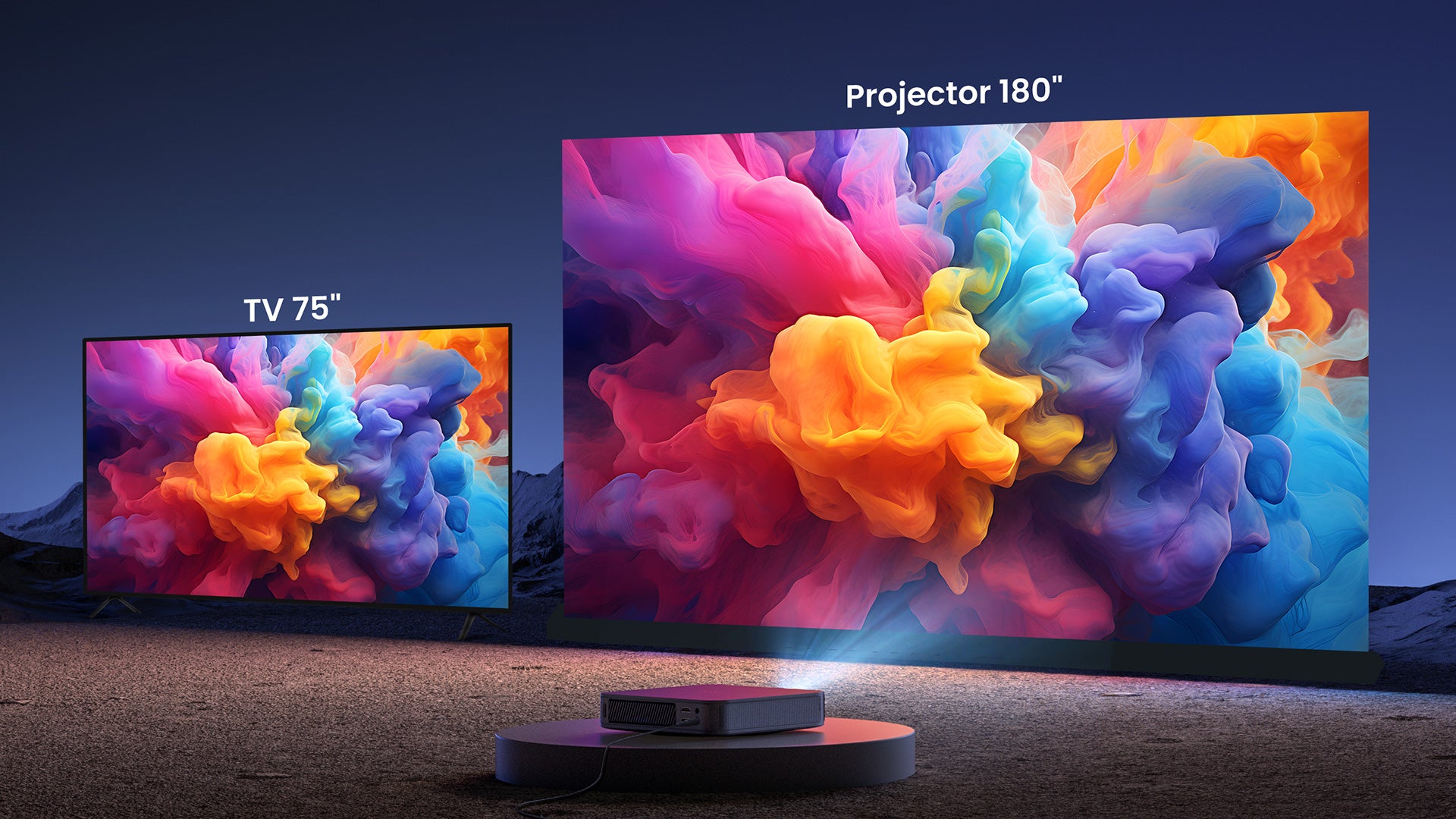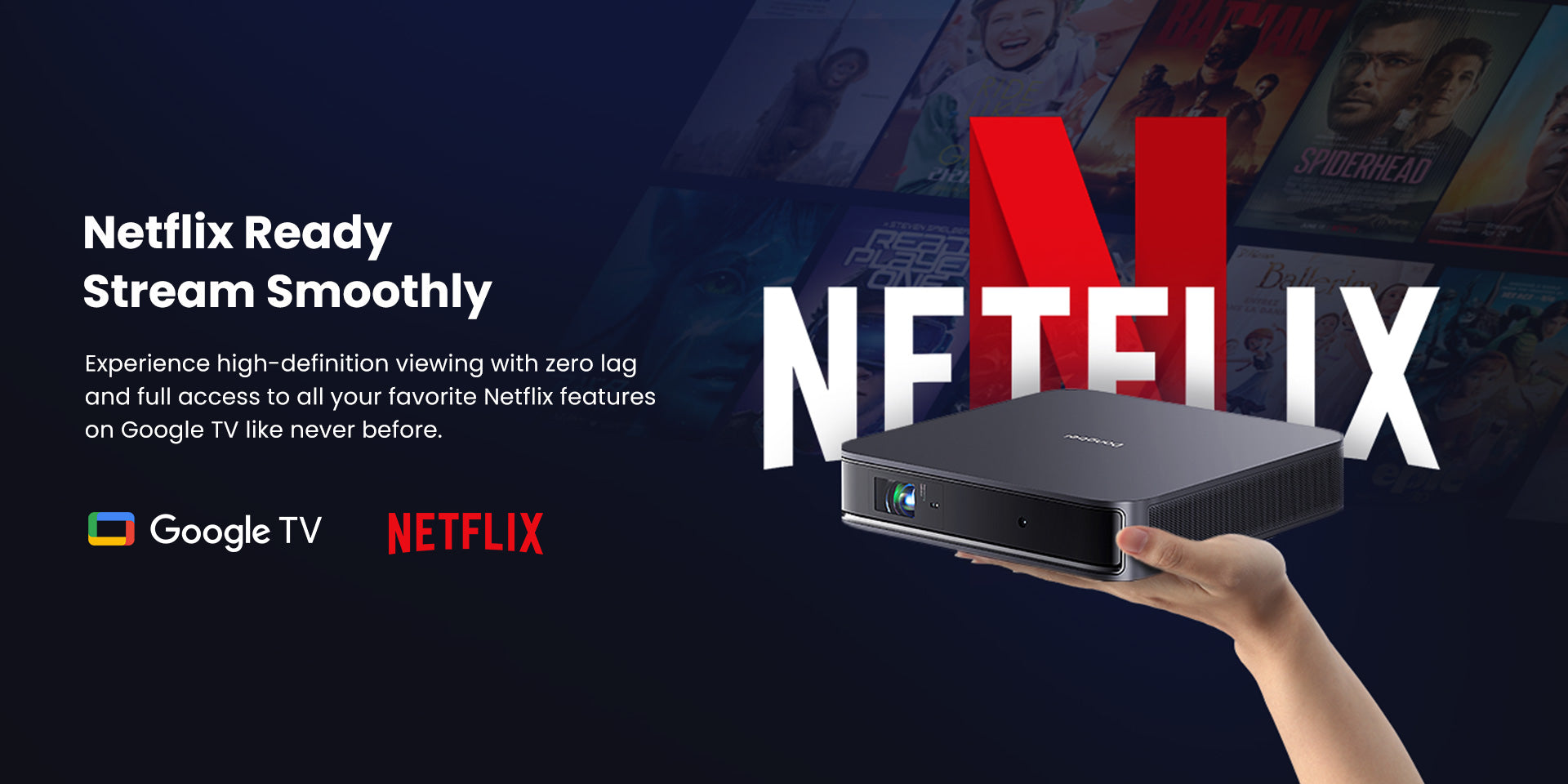No Products in the Cart
The quest for the ultimate home theater experience is an ongoing battle. In one corner, we have the TV, a familiar champion that's constantly evolving with larger screens, sharper resolutions, and dazzling features. In the other corner, the projector stands tall, promising a cinematic experience that beats the big screen TV.
In fact, even the biggest TVs can’t produce an image as big as what’s possible with a budget projector. Modern projectors around $1000 have great picture quality. But which one is truly better for your home theater?
In this blog, we'll delve into the strengths and weaknesses of projector vs TV, helping you make an informed decision that aligns with your needs and preferences.

|
Feature |
Projector |
TV |
|
Screen Size |
Massive, highly customizable |
Limited by physical size |
|
Portability |
Highly portable |
Not portable |
|
Picture Quality |
Very good |
Excellent |
|
Brightness |
Lower, best for controlled light |
Higher |
|
Built-in Smart Features |
Available on most models |
Available on most models |
|
Gaming |
Immersive experience |
Good experience |
|
Eye Strain |
Less |
More |
|
Power Consumption |
Less |
More |
|
Setup |
Requires adjustments |
Plug-and-play |
|
Price (for similar size) |
More affordable |
More expensive |
Simple Setup: TVs are the epitome of user-friendliness. Simply plug them in, connect your devices, and you're good to go. No fiddling with screens, adjusting throw distances, or battling ambient light. They're perfect for casual viewing and integrate seamlessly with smart home systems.
Picture Perfect (Almost): Modern TVs boast stunning picture quality. High-resolution displays, vibrant colors, and deep blacks deliver an immersive viewing experience. Features like HDR (High Dynamic Range) further enhance the visuals, showcasing incredible levels of detail and contrast.
Sound Sensational: Modern TVs pack a punch when it comes to audio. Dolby Atmos and other surround sound technologies create a truly cinematic soundscape.
Always-On Appeal: TVs function flawlessly in any lighting condition. Whether it's a bright sunny afternoon or a movie night with the curtains drawn, they deliver consistent picture quality.
Size Limitations: While TVs are getting bigger, they still have limitations. If you crave a cinematic home theater experience with a colossal screen, projectors take the crown.
Price for Size: A big screen TV can be significantly more expensive, especially when compared to a projector.
Eye Strain Concerns: The constant bright light emission from
Cinephile's Dream: Projectors take the crown for sheer size, effortlessly producing images exceeding 100 inches. Transform any blank wall into your personal cinema with a simple projection. Imagine the magic of watching the latest blockbuster on a truly massive screen at home!
Portability Powerhouse: Unlike TVs, projectors are surprisingly portable. Pack them up for movie nights under the stars, presentations on the go, or even transforming your backyard into a gaming haven. Any space can become your display with a blank wall or projector screen - perfect for your needs.
Budget-Friendly Bonanza: For a truly cinematic experience, projectors often offer a more cost-effective solution compared to similarly sized high-end TVs. This makes them ideal for those seeking a bang for their buck. For less than $1600, you can have a 4K laser home theater projector capable of projecting a stunning 200-inch image.
Gaming Glory: Projectors offer a distinct advantage for gamers. The expansive projected screen creates a truly immersive experience, pulling you right into the heart of the action. Many modern projectors now feature HDR, and some are specifically designed with gamers in mind.
Eye Strain Savior: Projectors reflect light instead of emitting it directly, potentially reducing eye strain for marathon viewing sessions.
Eco-friendly: Compared to a typical 98-inch TV (550W), a 150W projector consumes a mere 25% of the power, making it a champion for the environment.
Brightness Blues: Projectors generally struggle with brightness, especially in well-lit rooms. This can lead to washed-out colors and a less than ideal viewing experience during daytime. Look for projectors with high lumens (a measure of brightness) for better performance.
HDR Hurdles: While some projectors support HDR, their effectiveness in displaying the full range of colors and contrast is often limited compared to TVs.
TVs, even the biggest ones, can't compete with the sheer scale a projector can achieve. Even budget-friendly models can project massive images exceeding 100 inches, with some high-end options boasting capabilities of up to 300 inches. This unmatched size makes projectors perfect not only for creating a home theater experience, but also for presentations in large meeting rooms, educational settings, and even cinemas. Projectors deliver a truly immersive viewing experience for movies, TV shows, sports, and games, surpassing most TVs in this regard. Imagine everyone in a large meeting room clearly seeing presentation details, even from the back row. Projectors offer the same benefit in classrooms and institutes, making them a compelling choice for educators.
Projectors offer the best of both worlds: massive screens and amazing portability. Unlike bulky TVs that are stuck in one place, projectors let you bring the big screen experience anywhere in your home. Mini projectors are emerging, offering both incredible portability and impressive performance, for example, the ultra-thin Atom mini laser projector. Forget limitations – move your projector around for different needs. Want to binge-watch shows or play games on a giant screen? Take it to the living room or bedroom. Feeling inspired to cook? Move it to the kitchen and follow recipe videos step-by-step on a massive display. Projectors even let you get creative during holidays. Imagine transforming a blank wall into a virtual window, complete with life-sized fireworks, for a truly immersive celebration – all from the comfort of your couch!

Modern TVs handle any lighting situation, making them perfect for movie nights or sun-drenched living rooms. While some projectors boast impressive brightness over 3,000 lumens, TVs generally outshine them in this area. Especially budget-friendly projectors require a dimmed environment for optimal viewing.
Beyond brightness, TVs generally boast superior picture quality. While some projectors support HDR, their ability to showcase the full spectrum of colors and contrast often falls short compared to TVs. Although advanced DLP laser projectors can deliver very good picture quality, suitable for everyday viewing, they may struggle to achieve the deep blacks of modern TVs.
So, which one is better for you? The ideal choice depends on your individual needs and preferences. Consider your priorities and viewing habits before making your decision.
For cinephiles: Projectors for the massive screen
For gamers: Projectors for the immersive experience, or TVs for a good balance of features and picture quality
For binge watchers: Projectors for reduced eye strain
For budget-conscious viewers: Projectors for affordability
For those enjoying HDR content: TVs for better picture quality
For those preferring a fixed display: TVs
For those prioritizing convenience: TVs for plug-and-play ease of use
For those seeking an around-home solution: Projectors for portability
For those preferring to explore possibilities: Projectors for flexible usage and scenarios
For spaces with limited control over ambient light: TVs for consistent performance
Q: What's the main advantage of projectors over TVs?
A: The primary advantage of projectors is their ability to produce massive screen sizes, often exceeding 100 inches or even 200 inches. This creates an incredibly immersive viewing experience for movies, gaming, and more, surpassing the size limitations of even the largest TVs.
Q: Are projectors difficult to set up?
A: While projectors require some initial adjustments like positioning and focus, modern models are relatively user-friendly. Once set up properly, they offer plug-and-play convenience similar to TVs.
Q: Do projectors work well in bright rooms?
A: Most projectors struggle with brightness in well-lit environments, leading to washed-out colors and reduced picture quality. For optimal performance, projectors work best in dimmed or controlled lighting conditions. Or, choose a projector with high brightness.
Q: How does the picture quality of projectors compare to TVs?
A: High-end TVs generally offer superior picture quality, with deeper blacks, better HDR performance, and more vibrant colors. However, some advanced laser projectors can deliver excellent picture quality suitable for everyday viewing.
Q: Are projectors good for gaming?
A: Yes, projectors can provide an incredibly immersive gaming experience thanks to their massive screen sizes. Some models are designed specifically with gamers in mind, offering features like low input lag and fast response times.
Q: Do projectors consume more power than TVs?
A: No, projectors typically consume less power than comparably sized TVs, making them a more eco-friendly option for large-screen viewing.
Q: Can projectors be used for presentations or educational purposes?
A: Absolutely! Projectors are widely used in classrooms, meeting rooms, and other professional settings due to their ability to produce massive, clearly visible displays suitable for presentations and educational content.
Q: Are projectors portable?
A: Yes, projectors are generally more portable than TVs, allowing you to easily move them around your home or take them on the go for outdoor movie nights, gaming sessions, or presentations.